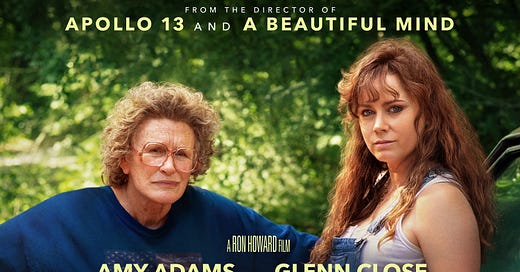No, Mamaw: Don’t blame Ron Howard’s ‘Hillbilly Elegy’ for the rise of J.D. Vance
The 2020 movie adaptation of the future Senator's memoir didn't get a great reception- but it's far from the reason why Vance may be named Trump's running mate this week.
Ohio Senator J.D. Vance will speak at the Republican National Convention in Milwaukee this week, and scuttlebutt says he may be introduced as Donald Trump’s vice presidential pick. (He also, over the weekend, blamed President Biden for the assassination attempt on Trump.)
Vance, of course, first came to prominence as the author of his 2016 memoir Hillbilly Elegy, in which he both told the story of his rise from poverty and expressed some opinions about the condition of the rural underclass in America’s heartland.
After Trump was elected in 2016, many liberals turned to Vance’s book for insight into how they’d missed the new president’s rise. At the time, however, Vance was vocally anti-Trump, describing him as “a Never Trump guy” and ripping Trump as “noxious” and “an idiot.”
By the time he started running for the Senate in 2022, Vance had changed his tune. Like most “never-Trumpers,” the “never” part was quite temporary; he was elected to the Senate as a committed Trump acolyte.
Another big part of the story of Vance’s rise was the Hillbilly Elegy movie adaptation, which arrived on Netflix in late 2020.
Occasionally, you’ll hear someone blame Howard or the movie for Vance emerging as a political figure who could end up Trump’s successor. But that’s not quite fair.
And that’s because Howard’s Hillbilly Elegy is both a bizarre film and a not-very-successful one, full of baffling choices. But it’s not the reason Vance either first got in the zeitgeist or why he stayed there.
Howard’s movie completely ignored most of the book’s politics, concentrating on Vance’s life story. But in doing so, he cast a nearly complete non-entity of an actor (Gabriel Basso) as Vance’s adult self. He stuck him in scenes with two actresses (Glenn Close and Amy Adams) who spent most of the movie doing loud, histrionic overacting. Those two performers have been nominated for Oscars many times without ever winning, and that streak continued with Hillbilly Elegy.
Ron Howard was not the right director for this project, and in a film where the sense of place should be significant, the Ohio town needed to be more consistent.
Indeed, “failed Oscar bait” is an excellent category to put Hillbilly Elegy in. It came out in late 2020, clearly positioned for awards season, but didn’t have much success in that regard, even in the light pandemic year in which Nomadland won Best Picture. Its Oscar nominations were for Close and for Makeup and Hairstyling, and neither won.
Netflix doesn’t exactly publish reliable viewership statistics, but despite debuting at #1 on Netflix’s list on its release date, I don’t get the sense that the movie was a huge success on the service.
Therefore, the movie has little to do with why Vance became a Senator or why he might become vice president.
Ironically, there is evidence that Vance was “radicalized” partly by the reaction to the movie. Per a Washington Post profile during his Senate campaign:
When the “Hillbilly Elegy” movie came out on Netflix in 2020, it was not just critically panned but greeted with intense online mockery, and the tenuous cultural diplomacy achieved by the book seemed to unravel for good. (Rotten Tomatoes audience score: 83 percent. Critics’ score: 25 percent.) According to Vance’s best friend from Yale, Jamil Jivani, the wounding commentary was the “last straw” in his falling-out with elites.
Yeah, the movie was bad, but I don’t feel like its reception was a mandate on J.D. Vance; it was more every other aspect of the production. And once again, I’m honored, as a film critic, to be considered among the “elites.”
If J.D. Vance becomes the vice president of the United States, I don’t get the sense that the Hillbilly Elegy movie will be the reason why.




